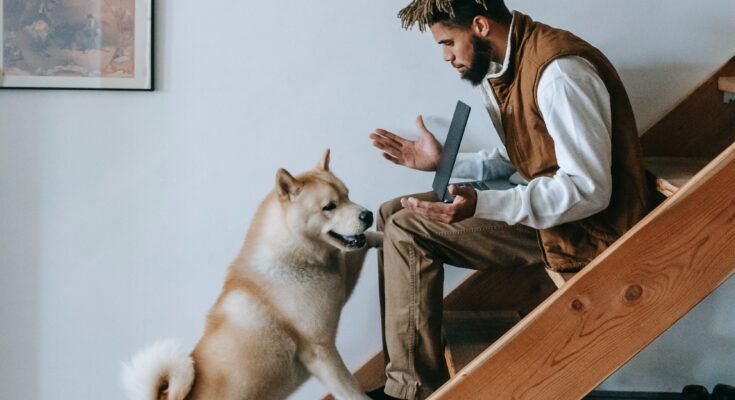Intro
Dogs are often seen as man’s best friend, but that friendly bond can get strained when they start pooping inside the house. It’s a common issue for pet owners, and many ask how to punish dogs for pooping in the house. However, it’s important to understand that punishment should always be about teaching, not hurting or instilling fear. This article will guide you on how to deal with this issue effectively.
The Importance of Consistent House Training
Laying out a predictable preparation routine right off the bat is a critical part of keeping your canine from crapping in the house. It’s essential to show your pet where they can and can’t assuage themselves. While youthful canines may at first feel the motivation to go potty anyplace, they are fast students and can grasp the idea of going potty outside. By taking your pet outside for regular toilet breaks and celebrating their correct behavior, they will start to grasp the expectations.
Keep in mind, that the point here is to lay out clear house decides and rules that your canine can observe, making your pet more agreeable and the preparation cycle smoother. Consistency is key in this cycle, so guarantee you adhere to an ordinary daily practice to help your pet understand and comply with the house rules.
The Correct Way to Punish Dogs for Pooping In House
Addressing your dog’s poop indoor messes correctly is less about punishment and more about behavior correction. If you catch your pooch in the middle of the act, disrupt them gently without inducing fear. Firmly command them with words like “no” or “outside,” then quickly lead them outdoors to finish their business.
Always steer clear from resorting to physical penalties or loud admonishments. These reactions may foster feelings of anxiety or fear in your pet, potentially escalating the issue further. Remember, dogs cannot connect past actions with current consequences. So, if you don’t catch them during the act, reprimanding them afterward will only confuse them.
Instead, guide your pet to understand the correct place for elimination by calmly and immediately correcting them mid-act. The emphasis here is on the immediacy of the correction and guidance, helping your pet to learn the appropriate behavior more quickly.
Clean the Soiled Area Thoroughly to Discourage Repetition
In the unfortunate event that your pet does relieve themselves indoors, be certain to clean the affected area thoroughly. The reason is, that any lingering scents from previous incidents may signal to your dog that it’s an appropriate spot for future bathroom breaks.
To efficiently remove these odors, it’s recommended to utilize an enzyme-based cleaning product. This particular type of cleaner works by breaking down the proteins found in urine or feces, thereby fully eliminating the odors they leave behind.
Using everyday household cleaners may not fully eradicate these smells, potentially leaving a trace scent that could attract your dog back to that area. Thus, deep cleaning is crucial not just for hygiene purposes but also to help prevent repeat offenses.

Ways to Punish Dogs for Pooping in House
Addressing the issue when your dog poops in the house may seem challenging. When considering corrective measures to punish dogs for pooping in the house, it’s essential to emphasize guidance rather than punishment. First and foremost, catch your dog in the act.
Remember, dogs can’t make the connection between their past action and your present anger. If you find them about to do their business, interrupt them gently and say words like “No!” or “Outside!” Over time, this helps the dog associate pooping with being outdoors.
Never resort to harsh measures to punish dogs for pooping; instead, use these moments as teaching opportunities. Dogs respond better to positive reinforcement, so when they do it right, reward them. Remember, the goal isn’t to instill fear but to guide your dog towards better behavior.
Seek Professional Help If Needed
Constant indoor end, despite your predictable preparation endeavors, could be characteristic of a fundamental issue. Your pet might be battling with an ailment that is adding to this undesirable way of behaving, or there may be a more profound social worry that you’re not prepared to deal with alone. In such examples, looking for help from a professional is prudent.
Contact a veterinarian for a careful clinical assessment to preclude any well-being-related issues. Should the indoor crapping endure even after a physician’s approval, now is the right time to consider reaching out to an expert canine mentor or behaviorist. They possess the expertise to address and rectify specific behavioral issues that may be encouraging your pet’s inappropriate elimination. Refrain from enduring the issue alone; getting professional help when necessary can expedite the process of correcting your dog’s behavior.
Rewards and Positive Reinforcement
Instead of focusing on techniques to rebuff canines for crapping in the house, consider supporting acceptable conduct with remunerations. Utilizing uplifting feedback is an amazing asset in preparing. Whenever your canine accurately takes out outside, make it a festival. Offer them their number one treats, give them acclaim, or connect with them in a festive game.
This not only makes a lovely relationship with the demonstration of going potty outside, but it also moves them to proceed with this ideal way of behaving. Gradually, your dog will form a positive connection between outdoor elimination and these rewarding experiences, propelling them to continue the good habit. Training a dog requires patience and persistence, but with a steady routine and positive reinforcement, your dog can certainly adapt to the habit of keeping their business outdoors.



